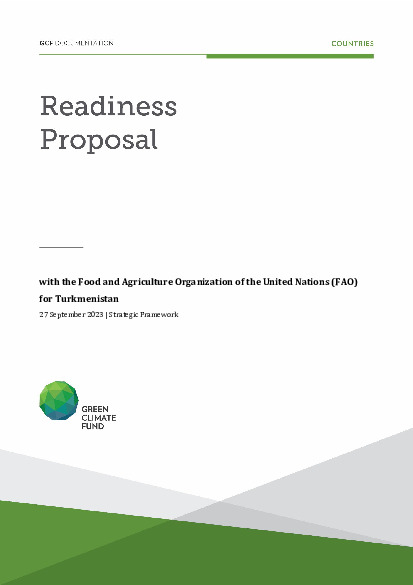Improving the capacity of Turkmenistan to access climate finance through capacity building and strategic frameworks

Improving the capacity of Turkmenistan to access climate finance through capacity building and strategic frameworks
The current proposal is developed based on the country-specific vulnerability to climate change impact on agricultural sector taking into account the existing gaps and barriers at the institutional and technical levels. After the assessment of the state of the natural resources, interventions of other agencies and national institutional set-up and legislative environment, the proposed measures will enhance the capacity of the government of Turkmenistan to facilitate the access to climate finance and to improve compliance with the national targets under the Paris Agreements while promoting cross-sectoral collaboration and the engagement of diverse stakeholders in an integrated manner.
The existing environmental issues as land degradation, salinization, water shortage are exacerbated by climate change impact. The increase of temperatures and change in the precipitation will increase aridity even more, as well as impact the water resources. It will have negative effects on agriculture and health, among others. An increase of droughts is likely to negatively affect cotton, cereals, and forage production, increase already extremely high water demands for irrigation, exacerbate the already existing water crisis, and accelerate human-induced desertification.
In this regard, the country is proactive to build up the capacity at institutional and technical levels to increase resilience of farmers to climate change impact, and is a party to the United Nations Framework Convention on Climate Change and the Paris Agreement on climate change. There are several important legal documents and recent policy developments that form a good basis for Turkmenistan’s aspiration to mainstream low-carbon, climate-resilient considerations into its broader sustainable development objectives. The National Climate Change Strategy was updated in 2019, and the Action Plan on implementation of the Paris Agreement was prepared in 2022. However, there are some gaps that impede the faster transition to the low-carbon economy or decrease the adaptive capacity to climate change. Lack of cross-sectoral coordination in the climate actions decrease the participation level of relevant ministries and agencies, as well as stakeholders.
Furthermore, Turkmenistan has many opportunities to attract climate finance because of the vulnerability of the region. However, the implementation of large-scale projects requires institutional capacity, development of the country’s strategic frameworks and comprehensive monitoring. For the purpose of climate action enhancement, gaps such as lack of efficient systems for tracking and labeling climate finance; insufficient knowledge of appropriate technologies for climate change mitigation and adaptation; lack of acomprehensive plan for implementing and financing the Nationally Determined Contribution low capacity to report and monitor climate actions and goals, limited engagement of the private sector in climate action and inadequate investment opportunities and lack of climate finance slow the progress towards enhancing resilience, particularly in extremely vulnerable areas as the Aral Sea.
In order to address the mentioned above gaps, the current proposal is developed to bring concrete actions of inter-ministerial collaboration on climate change and strengthening of the strategic frameworks to build long-lasting capacity for sustainable change.
By providing a standardized and transparent system for climate finance tracking under the Outcome 1.1., the digital tools enable the Ministry responsible for the Nationally Determined Contributions (NDCs) to effectively manage and monitor climate finance, ensuring its proper allocation and utilization. It will enhance transparency, accountability, and facilitate better decision-making.
The identification, assessment, and prioritization of technologies for climate change mitigation and adaptation under the Outcome 1.3 will ensure that the selected technologies align with the country's strategic goals and legal frameworks, promoting consistency and coherence in climate actions and the role of the Regional Center for Climate Technology in Central Asia (RCCT-CA) enhanced.